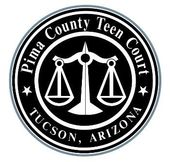Teen Court History
Pima County Teen Court is a program of the YWCA Southern Arizona. It began in January 1995 has conducted over 8,000 cases.
Teen Court's current recidivism rate is 11%. Teen Court Works!!
Teen Court sponsors Teen Court in the Schools, which presently offers an alternative disciplinary option to middle and high schools in Pima County.
Teen Court's current recidivism rate is 11%. Teen Court Works!!
Teen Court sponsors Teen Court in the Schools, which presently offers an alternative disciplinary option to middle and high schools in Pima County.
Constructive Consequences
Teen Court assigns constructive consequences that are designed to help the defendant understand why their behavior was wrong, repair the harm they caused, and make better choices in the future.
Each sentence includes a mandatory Basic Training Workshop, which discusses on juvenile law, the arrest process, and family communication. Letters of apology are also assigned, and defendants are to return to serve on the jury for minors referred to the program in the future.
Other workshops discuss substance abuse, shoplifting, and anger management issues. Meditations are offered to resolve family disagreements and issues at home, as well as conflicts between peers.
Each sentence includes a mandatory Basic Training Workshop, which discusses on juvenile law, the arrest process, and family communication. Letters of apology are also assigned, and defendants are to return to serve on the jury for minors referred to the program in the future.
Other workshops discuss substance abuse, shoplifting, and anger management issues. Meditations are offered to resolve family disagreements and issues at home, as well as conflicts between peers.
Appropriate Cases for Teen Court Referral
Teen Court accepts 1st, 2nd and 3rd offense misdemeanor referrals. The most common offenses referred are:
Any teen between the ages of 12-17 who is eligible for diversion may be referred to Teen Court. Each teen must admit guilt to the offense for which they have been charged and be willing to complete the sentence assigned by the jury.
- Minor in Possession/Consumption of Alcohol, Marijuana, Tobacco, or other Dangerous Drugs
- Shoplifting or Theft
- Possession of Drug Paraphernalia
- Assault or Disorderly Conduct
- Criminal Trespass or Damage
- Interfering with the Peace at School
- False Reporting to an Officer
- Possession of a Weapon
- Felony offenses (if approved by CA Office)
Any teen between the ages of 12-17 who is eligible for diversion may be referred to Teen Court. Each teen must admit guilt to the offense for which they have been charged and be willing to complete the sentence assigned by the jury.
Parent/Caregiver Involvement
Teen Court can only work with the participation of the minors' adult. Parent/caregivers are required to attend the initial Teen Court hearing (3 hours), Basic Training Workshop (4 hours), and a Wrap-Up Appointment at the completion of their child's sentence (30 minutes).
If the minor is assigned the Substance Abuse Prevention Workshop (3 hours), their adult is required to attend.
If the minor is assigned the Substance Abuse Prevention Workshop (3 hours), their adult is required to attend.
What Happens after a Referral is Made?
Once the minor and the family have decided that Teen Court is the best option, paperwork is forwarded from juvenile court to the Teen Court staff, and the family is contacted within two business days of receipt. The minor is then scheduled for the next available Teen Court date.
On the date of the hearing, each teen will explain the reasons why he/she committed the offense. At this time, parents will also be given the opportunity to make a statement to the court on their child's behalf. Then a jury of teens will deliberate and decide a constructive consequence based on the minor's testimony in court.
After the hearing, the family will meet with an exit interviewer who schedules the dates for the workshops assigned by the jury. At this time, the prospective completion date is also scheduled. This date is typically 30 days after the initial hearing. The teen's probation officer is contacted and given a copy of the teen's contract with Teen Court. This includes his/her assigned sentence and the date on which the teen should complete his/her sentence.
There is no cost to participate in Teen Court. All services are covered by the generous grants and donations from our community.
On the date of the hearing, each teen will explain the reasons why he/she committed the offense. At this time, parents will also be given the opportunity to make a statement to the court on their child's behalf. Then a jury of teens will deliberate and decide a constructive consequence based on the minor's testimony in court.
After the hearing, the family will meet with an exit interviewer who schedules the dates for the workshops assigned by the jury. At this time, the prospective completion date is also scheduled. This date is typically 30 days after the initial hearing. The teen's probation officer is contacted and given a copy of the teen's contract with Teen Court. This includes his/her assigned sentence and the date on which the teen should complete his/her sentence.
There is no cost to participate in Teen Court. All services are covered by the generous grants and donations from our community.

